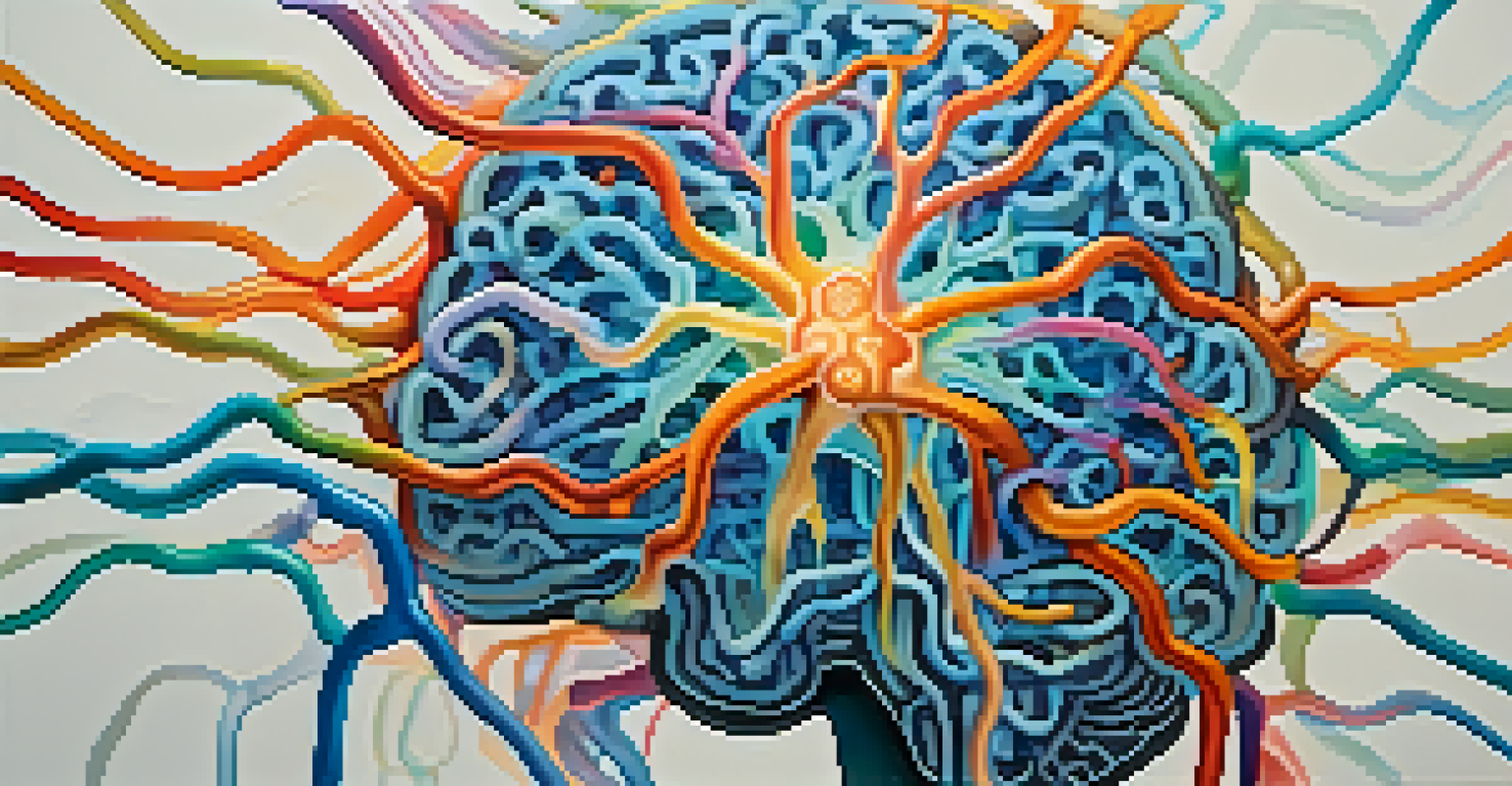The Future of Psychedelics in Treating Mental Health Disorders

Understanding Psychedelics and Their Historical Context
Psychedelics, substances that alter perception and mood, have been used for centuries in various cultures. Traditionally, they played a role in spiritual and healing practices, often seen as tools for self-discovery. However, the 20th century brought significant stigma and legal restrictions, overshadowing their potential benefits in mental health treatment.
Psychedelics are a tool that can help us understand our own minds and the nature of consciousness itself.
In recent years, there has been a resurgence of interest in psychedelics, particularly in the context of mental health disorders. Studies have begun to unveil their ability to foster profound psychological insights and emotional breakthroughs. This historical context sets the stage for understanding how these substances could reshape modern therapy.
As we look to the future, we see a growing body of research that suggests psychedelics may hold the key to unlocking new treatment pathways for conditions like depression, anxiety, and PTSD. The journey from taboo to therapeutic is just beginning, and it invites us to reconsider the role of psychedelics in healthcare.
Current Research and Clinical Trials on Psychedelics
Today's research landscape for psychedelics is vibrant and expanding. Clinical trials are underway across the globe, exploring compounds like psilocybin (found in magic mushrooms) and MDMA. These studies are providing valuable insights into how psychedelics can alleviate symptoms of mental health disorders and improve overall well-being.

For instance, studies on psilocybin have shown promising results in treating treatment-resistant depression. Participants often report a significant reduction in symptoms after just a few sessions. This evidence is critical as it helps destigmatize the use of psychedelics and paves the way for their acceptance in mainstream medicine.
Psychedelics: A Historical Shift
Psychedelics, once stigmatized, are gaining recognition for their potential in mental health treatment.
Moreover, organizations like MAPS (Multidisciplinary Association for Psychedelic Studies) are at the forefront of this research, advocating for the therapeutic use of psychedelics. Their work illustrates a collaborative effort between scientists, clinicians, and advocates to push the boundaries of what we know about mental health treatments.
How Psychedelics Work in the Brain
Understanding how psychedelics interact with the brain is crucial to their potential as therapeutic agents. These substances primarily target serotonin receptors, which play a role in mood regulation and perception. By enhancing neural connectivity and promoting neuroplasticity, psychedelics can facilitate new ways of thinking and emotional processing.
The use of psychedelics in a therapeutic setting can facilitate profound insights and emotional healing.
This neurochemical impact leads to altered states of consciousness that many users describe as 'mystical' or deeply transformative. Such experiences can help individuals confront and process traumatic memories, creating a pathway for healing. In essence, psychedelics may help break down the rigid thought patterns often associated with mental health disorders.
As researchers continue to unravel these mechanisms, we gain a clearer picture of how psychedelics can be integrated into therapeutic settings. This knowledge not only informs treatment protocols but also enhances our understanding of the human brain and its capacity for change.
Potential Benefits for Treating Mental Health Disorders
Psychedelics offer several potential benefits for those struggling with mental health disorders. One of the most compelling advantages is their ability to induce lasting changes in mood and perspective after just a few sessions. This contrasts with traditional medications, which often require long-term use and can come with unwanted side effects.
Moreover, psychedelics can facilitate deep emotional experiences, enabling individuals to confront and process underlying issues that contribute to their mental health struggles. This therapeutic journey often leads to greater self-awareness and personal growth, empowering individuals in their healing process.
Research Supports Psychedelic Therapy
Current studies show psychedelics like psilocybin can significantly alleviate symptoms of mental health disorders.
Notably, the use of psychedelics can also enhance the therapeutic alliance between patients and therapists. The profound experiences shared during sessions create a unique bond, fostering trust and openness that can significantly enhance treatment outcomes. This holistic approach is a promising shift in mental health care.
Challenges and Risks of Psychedelic Therapy
Despite the promise of psychedelics in treating mental health disorders, there are challenges and risks to consider. One major concern is the potential for misuse or adverse psychological reactions, especially in uncontrolled settings. It's crucial that these substances be administered in safe, structured environments, ideally under the guidance of trained professionals.
Additionally, not everyone may respond positively to psychedelic experiences. Some individuals may encounter feelings of anxiety or paranoia during sessions, which can be distressing. Therefore, careful screening and preparation are essential to ensure that participants are suited for this type of therapy.
Lastly, the legal landscape surrounding psychedelics remains complex and varies significantly from one region to another. Ongoing advocacy and education are necessary to navigate these challenges and promote safe, effective use of psychedelics in mental health treatment.
The Role of Integration Therapy After Psychedelic Sessions
Integration therapy is a crucial component in the psychedelic healing process. After experiencing a psychedelic journey, individuals often need support to make sense of their insights and emotions. This is where integration therapy comes into play, helping individuals process their experiences in a therapeutic setting.
During integration sessions, therapists assist clients in discussing their feelings, thoughts, and revelations from their psychedelic experiences. This dialogue not only aids in understanding but also promotes personal growth and emotional healing. It's a space for individuals to explore how their experiences can translate into actionable changes in their daily lives.
Integration Therapy is Essential
Post-session integration therapy helps individuals process their experiences, enhancing the healing journey.
By emphasizing the importance of integration, we ensure that the benefits of psychedelics extend beyond the session itself. This holistic approach fosters lasting recovery and empowers individuals to continue their healing journey long after the psychedelic experience.
The Future of Psychedelics in Mental Health Care
Looking ahead, the future of psychedelics in mental health care is both exciting and promising. As research continues to grow, we are likely to see an increase in clinical acceptance and integration of psychedelics into therapeutic practices. This shift could revolutionize how we approach mental health treatment, offering new hope for those with treatment-resistant conditions.
Moreover, ongoing public discourse around mental health and wellness may help reduce stigma associated with psychedelic use. As more individuals share their positive experiences, society may become more open to exploring these innovative treatments. This cultural shift is essential for paving the way for broader access to psychedelic therapy.

Ultimately, the future of psychedelics in mental health care hinges on continued research, education, and advocacy. By fostering a collaborative environment among scientists, clinicians, and patients, we can unlock the full potential of psychedelics as transformative tools in combating mental health disorders.